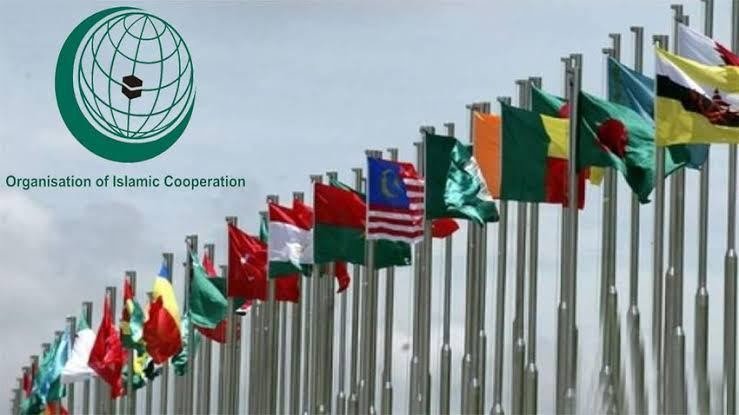Safia Ramzan
The continuing atrocities in Gaza have once again drawn condemnation from the Organisation of Islamic Cooperation (OIC). Meeting in Jeddah, the foreign ministers of the Muslim bloc produced a lengthy thirty-eight–point resolution, brimming with moral outrage and declarative intent. The language is strong, the sentiments lofty, and the commitment to Palestinian rights repeatedly emphasized. Yet behind this rhetoric lies a troubling vacuum of action. While statements circulate in diplomatic halls, Palestinians remain trapped under bombardment, deprived of food, medicine, and shelter, as Israel continues its relentless assault with full confidence that impunity is guaranteed.
The contrast between the OIC’s declarations and the realities on the ground could not be more stark. The Nasser Hospital, a supposed sanctuary, has been bombarded; journalists, including those working for Western agencies, have been killed in deliberate attacks; and civilian populations face systematic starvation. These are not incidental tragedies but structural elements of Israel’s ongoing campaign in Gaza. Yet, despite the OIC’s formal condemnation and its calls for sanctions and embargoes, there is little to suggest that the bloc’s member states will move beyond symbolic words. The crisis illustrates not only the brutality of Israel’s occupation but also the paralysis of the Muslim world’s collective institutions.
The resolution rightly calls on all states to suspend arms sales and impose sanctions on Israel. But the unanswered question remains: why do OIC and Arab League states not lead by example? For decades, trade, energy, and even intelligence links with Tel Aviv have remained quietly intact, even as Palestine burns. The credibility of Muslim states is undermined when their governments maintain relations with Israel, whether directly or through tacit channels, while issuing statements of solidarity with the Palestinians. This duplicity emboldens Israel further, for Tel Aviv has learned through experience that it faces condemnation without consequence.
The Zionist project is not limited to Gaza. Prime Minister Benjamin Netanyahu’s articulation of a “Greater Israel,” stretching from the Nile to the Euphrates, is not an abstract fantasy but a political vision with territorial implications. The OIC resolution itself acknowledges this agenda. A glance at a map reveals that such a project would engulf multiple Arab and Muslim states. The occupation of Palestinian, Syrian, and Lebanese land offers empirical proof of Israel’s expansionist trajectory. Therefore, the silence and inaction of Muslim rulers today risk not only Palestine’s annihilation but also the erosion of their own territorial sovereignty tomorrow.
https://facebook.com/RepublicPolicy
To dismiss these concerns as conspiracy would be a mistake. Israel has consistently demonstrated its commitment to territorial acquisition and demographic engineering. Ethnic cleansing, forced displacement, and settlement expansion remain central to its strategy. Once Palestinians are expelled or neutralized, other states in the region may face similar destabilization. This is precisely why the failure of the Muslim world to act decisively is not merely a betrayal of Palestine but an existential gamble with their own futures.
https://tiktok.com/@republic_policy
The OIC and Arab League possess both the political leverage and economic instruments to alter Israel’s calculus. A coordinated suspension of trade, energy boycotts, and arms embargoes would send a powerful message, particularly when Western powers remain unwilling to restrain Tel Aviv. Yet, these measures require political will — something that is consistently absent. Instead, Muslim rulers rely on rhetorical denunciations while maintaining status quo relationships with Israel and its allies. This dichotomy exposes the structural weakness of Muslim diplomacy: it confuses words with action and symbolism with substance.
https://instagram.com/republicpolicy
History is unkind to nations and leaders who consistently choose timidity over action. Palestine is not merely a humanitarian tragedy but a political test of the Muslim world’s collective will. Each delay in decisive measures deepens the humanitarian catastrophe, erodes the credibility of Muslim diplomacy, and widens the scope for Israel’s impunity. It is not enough to convene conferences and issue verbose communiqués. What matters is concrete action — trade embargoes, financial sanctions, and coordinated political isolation of Israel. Without these, the OIC risks becoming an institution of eloquent words and hollow promises.
https://whatsapp.com/channel/0029VaYMzpX5Ui2WAdHrSg1G
In conclusion, the gulf between the OIC’s resolutions and its actions is fueling the suffering of the Palestinians while enabling Israel’s ambitions. Gaza today represents both a humanitarian catastrophe and a litmus test for the Muslim world’s credibility. Unless Muslim states match their rhetoric with bold and coordinated action, history will remember them not as defenders of Palestine but as complicit bystanders in its destruction. The choice is stark: either confront Israel’s aggression with real measures or watch as the vision of “Greater Israel” consumes not only Palestine but much of the region.
















